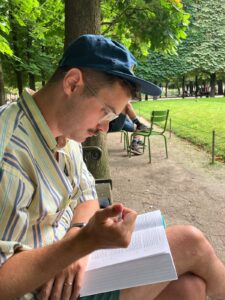Cary Stough, featured in the new Ocean State Review
Sonnet With Some Lines of Delmore Schwartz
1.
Joshua fits the deer (with missile-launchers).
This amuses, this indeed is our solace.
Suddenly and certainly, (!) our palace
I watched Domingo pass into Autumn’s rays,
Who will knock at the door, saying “Who
will knock at the door?” When, off
in the distance, may I perhaps return to you,
“passes in front of our lenses” like weather.
I watch Dominick’s rays pass into Joshua.
April bowing softly in my teen rage, lit a
cigarette to the slight Pyrenes,
my nipples made—Near as my heart,
a red-feathered fire
sprinkling in the dark…when I marry you.
2.
Winter sky’s pure capital, donned
at the outset by capitals, the pure cowboy
hat’s puerile misgivings…the white wall.
The bird called, tentatively, whistled, called.
Emily Dickinson, as they say, flown-over.
(The bird-call—tentative, whittled—slobbers
on the dining room table. When it yawns….
With you I feel a bit of encompassing
splendor, My friend, this is neither
the place for this, nor time (!) as the runners
are lifted upon an affable decree.
Our benchmark, —back to bed
with exhausted eyes. And, at last!
the dumb engines put away,
3.
Mornings, per usual, nudity reigns
supreme, preparing the awful scene, and in
the penance / of patience, (read: labor) awaiting the serene
exaltation. This is what it’s like? Of the recent?
At a too-young age, repainting the awfully inaccurate
wall: (read: St. Valentine in Funeral Town)
This state’s final shot, shadowed in the garden, strictly
poor with branches. Wad of sunlight flashing
like a whip on the feline’s behalf, whose little life
owes the women “zilch.” The parted lips of a
burning. Beneath the garden? Still in the untouched blue.
Still, my honor tells me, dear criminals,
how deeply the mother strictly retains the womb’s
authority, and, well, honestly does so, now
Cary Stough on “Sonnet With Some Lines of Delmore Schwartz“:
I wrote the first two-thirds of this “sonnet of sonnets of another poet’s lines” in 2017—it was the beginning of a time in which my sense of what makes a poem completely shattered. Though it might seem as if the italicized lines of Delmore Schwartz are some play of pastiche, they’re more like porticos under which I felt I could hide from the storm of my own lines coalescing, or not. I once again feel the intense comfort reading “Winter sky’s pure capital,” and revel in the private pleasure I derive from having chopped up my favorite of Schwartz’s lines from the poem “Prothalamion,” “Near as my heart, dark when I marry you,” in section 2. Through indelicate paraphrasis, I withheld Demlore his “dark.” I took it. I kept the dark for myself.
Because Schwartz’s lines have always girded me with such courage, a courage coming, itself, from the poet’s indefatigable witnessing of his own shortcomings, fears, and, yes, Oedipally sexual hang-ups, their presence here among my own predilections (missile launchers, feathers, nipples, gardens) feels life-affirming. Someone has to soak up all the excess “teen rage!” And sometimes Emily Dickinson isn’t enough. Like the Countess of Amherst, Schwartz died in relative obscurity, despite his past accolades, and admirers, literary and pedagogical—Lou Reed, a bright star among his writing students. Unlike Dickinson, Schwartz died alone. I don’t know how he did it: write these poems, live with himself. How does anyone do it? This isn’t a question poetry has ever answered. It might be, however, the question poetry incessantly poses. Poetry delivers us to the face of our teen self, of our infant self, and compels us to wonder “What killed you? And who, brandishing the wand of forgetting, is sprinting toward me as we speak?”
I didn’t complete the final section until 2021. Blocked in my way after the firetruck-red slap of “parted lips of a / burning,” I humbled myself, and the poem, with a question. Schwartz’s “Still in the untouched blue” which follows provides a nice quotient of undecidability—is what is still unmoving in time or space? Is there a difference? What’s beneath the garden? I further humbled myself by allowing the poem to end on a quintessentially Schwartzian, mother-obsessed let-down; the infinity of an unpunctuated “now.” Why didn’t I throw another “(!)” somewhere in there? Lord knows. I could never write these poems again if I tried. The muses are faint. Though, there was a time when I faltered and needed assistance—and I could ask for it—and, “like a fate / Near as my heart,” Delmore and I touched.
Cary Stough is a poet and critic from the Missouri Ozarks. He holds an MFA in Literary Arts-Poetry from Brown University and is currently a PhD student in English at the University of Iowa. He is an editor at the Cleveland Review of Books.

